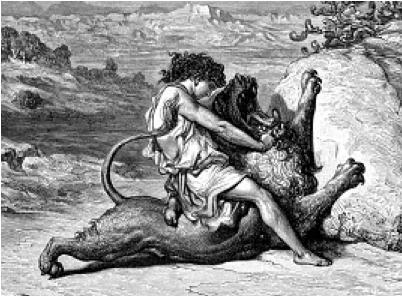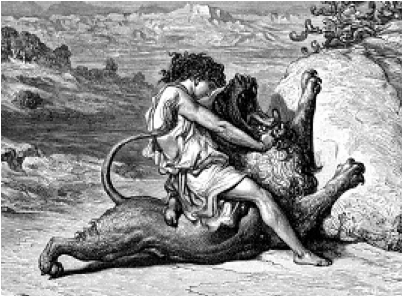
Samson’s judgeship is reported as thoroughly as Gideon’s, while several judges get only two or three verses. He is the last judge (excluding Samuel, who may or may not be classified as a judge). Because of his glaring weakness, we tend to learn negatively from him (What not to do). But let’s look at God’s orchestration of his total life.
In part one, his commission from God was pointed out: Samson was to “begin to deliver Israel” (Judges 13:5).
Most other deliverances were one-man sized. One man brought the deliverance, led Israel and then died. One guy. One and done. Not so in this deliverance. Samson began the deliverance of Israel, working from the west side of Israel, while Samuel taught the people on the east side of the nation. So humanly speaking, it was a two-person deliverance.
Instead of raising an army and drawing up battle lines, Samson occupied the attention of the Philistines; was a constant thorn in their side. Focused on Samson, the Philistines were not able to dominate the whole nation of Israel. True, the Philistines had defeated Israel, and could impose their will, but they became occupied with this one representative of Israel. Samson was their problem.
Let’s pick up the narrative in Judges 15:9. After the fire in the standing grain, the Philistines were determined to capture Samson. The Israelites were afraid of the Philistines who had conquered their nation years before and held a monopoly on iron (a huge technological advantage in weapons).
Some Israelites cooperated with the enemy by turning Samson over to them, blaming him for bringing danger on them (15:11). They bound him with two ropes and delivered him to the Philistines. How’s that for Israelite gratitude? Samson had been the one endangering himself while the cowardly Israelites stayed away. Samson might have retaliated against Israel. Instead of seeing Samson as a champion behind whom they should rally to oppose the Philistines, they criticized him (15:11). Samson’s attitude is most commendable; his self-control obvious.
A few thousand Philistines had come into Israelite territory for the express purpose of capturing one man. Israelites turned Samson over to them bound by ropes. But once Samson broke the ropes, they fled, and given an extra boost of strength by the Spirit (15:14), Samson was able to run fast after the retreating Philistines and kill 1000 of them. Amazing. It is hard to fathom how he could have done this, since arrows and spears could be launched at Samson from some distance. Fear rippled through Philistia! Dread of this one man occupied them. From the Philistine perspective, not only had the man not been captured, but he routed their whole army and killed one-thousand of them. And this had happened when Israel delivered Samson to them bound.
This would have been the talk of both nations. While the Israelites had not seen Samson’s previous feats of strength – they had all been done in Philistine territory — they were eye witnesses of this one. Any further effort to subjugate Israel at this time was put on hold. Indeed, Samson had occupied them, “beginning the deliverance of Israel.”
Samson recognized that God had given him this victory (15:18), which was a critical factor in continuing his endowment. For Christians today to give credit to God is also essential.
After this strenuous slaughter, Samson was depleted. He badly needed water. For him to collapse, or even die from exertion would diminish the moment’s impact on both nations. How many of us would ask for God to supernaturally provide water? Most of us would feel presumptuous making such a request. Not Samson. He did ask and God did miraculously provide water for him to drink. One of the reasons Samson is listed in the roll call of faith (Hebrews 11) is that he had faith to call upon God for water.
What factors were involved in this water miracle? First, God saw that he genuinely needed water. Second, God showed His approval of Samson’s actions toward the Philistines, and his earlier restraint with the critical Israelites. Third, God wanted to demonstrate His personal approval of Samson in order to give a rebuke to the Israelites for their treatment of His servant.
There had been no spring, and after this event there was a spring and it continued to flow. Once Samson had his fill, there was no need for it to continue, but it did so it was an on-going testimony to both nations. God has His ways of vindicating those who are true to Him, and rebuking those who are not.
Twenty Year Judgeship We are told twice that Samson judged Israel for 20 years (15:20 and 16:31). While it is normal to see the length of a given judgeship at the end of the tenure, the reference to a 20 year judgeship – coming at the ¾ mark (after chapters 13-15, but before chapter 16) is unusual. This is to show the time of Samson’s judgeship in relationship with the total account (judges 13-16).
How are we to place the events of Judges chapters 13-16 in relationship to the 20 year judgeship statement of 15:20? It seems best to understand that the events of chapters 13, 14 and 15 occurred quickly (within one year), followed by the 20 year judgeship, followed by the disastrous events of chapter 16 (Delilah; blindness; sport for the Philistines, collapse of the roof and the death of many Philistines).
Put in other words, Samson’s peacetime judging started shortly after his slaughter of the 1000 Philistines and continued until the sinful events of chapter 16. During those 20 years, the Philistines cooled on their Samson Capture mission and he ceased to provoke them, leading to a 20-year period of peace. Israelite thinking about Samson changed, creating the environment for his 20 years of leading the nation. How encouraging to him that the Israelites accepted his leadership, especially those who had tied him up and given him over to the Philistines (15:13).
Allowing one year for the events of Judges 13-15 and one year for the events of chapter 16, leaves an 18-year period for Samson’s peacetime judgeship. The point being that out of 20 years that are known to us by the Biblical record, the carnality was limited to two years maximum. Maybe the carnality period was even shorter. Maybe the Gaza harlot and Delilah – which deserve strong disapproval – lasted only a few months (out of 20 years). Yet, most of the preaching about Samson addresses this 1/10 of his public life. Seeing this distribution of time and knowing his God-given commission is the bigger perspective on Samson.
Source: Leon Wood’s Distressing Days of the Judges


It is important to finish well! Such a good judge until the end came. It is so easy to slip. Dr. Leon Wood’s words are so relevant to me.